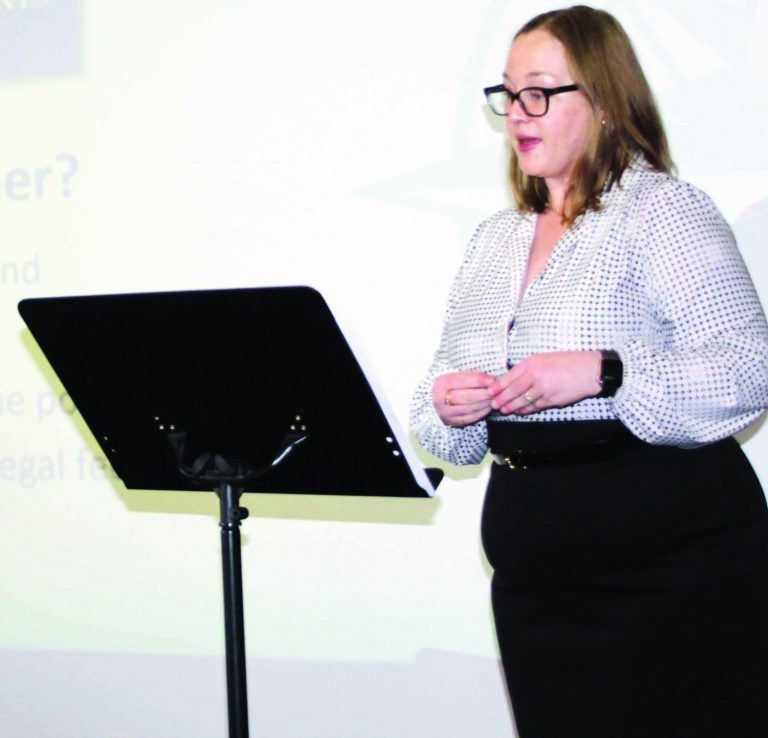Lunch and learn session discusses estate planning
By Rob Vogt – Local Press Writer
Residents and community members learned more about wills, enduring powers of attorney, and personal directives at a recent Lunch and Learn.
On Tuesday, Feb. 7, the Cottonwood Village Retirement Residence and Claresholm and District Family and Community Support Services hosted local lawyer Kendall Schille to talk about estate planning.
She began by explaining there are three key documents in estate planning – wills, enduring powers of attorney, and personal directives.
Wills
A will is a written document that disposes of your property upon your death in accordance with your instructions.
It also appoints a personal representative, who can also be called an executor, executrix or trustee, to administer your estate.
The will may also appoint a guardian for minor children.
Some of the reasons for having a will are peace of mind; control; minimizing possible fights; and paying less in legal fees.
Schille noted people say the government will get it all if you don’t have a will, but that is not necessarily accurate, because legislation is in place for estates without a will.
Anyone can make a will who is 18 years of age or older and has mental capacity. Anyone making a will is called the testator.
Schille then described undue influence and incapacity.
Undue influence is when the testator was coerced or manipulated into signing a will with which the testator did not agree.
Incapacity is when the testator lacks the mental capacity to give instructions; understand the extent of the testator’s property; understand the legal ramifications of making a will; and understand who the beneficiaries would be in the ordinary course of events.
There are two types of wills.
A formal will has the testator signing it in the presence of two witnesses, who are both present at the same time, and each witness signs the will in the presence of the testator.
Holograph wills must be wholly in the testator’s own handwriting and signed by the testator, so no witnesses or other formalities are necessary.
Schille went on to describe the meat and potatoes of making a will.
Appoint a personal representative who is responsible for administering the estate, and carrying out your wishes.
He or she can be an individual or trust company; must be 18 or older; of sound mind; preferably resident in Alberta; and preferably someone with an understanding of the testator’s wishes.
It is important to inform the personal representative ahead of time of their role.
Schille then discussed the disposition of your estate. The estate is all of the testator’s property that can be disposed of by way of a will, less any liabilities.
Beneficiaries are people named in your will to receive some portion of the estate, and include partners, children, grandchildren, parents, friends, and charities.
Property not covered by a will is property on which the testator is listed on the title as a “joint tenant”; bank accounts held jointly with a spouse; registered plans with a named beneficiary, such as registered retirement savings plans; and life insurance policies with a named beneficiary.
Joint tenancy comes with a right of survivorship, that is when one ,person dies, the deceased’s share rolls over to the surviving person.
With bank accounts held jointly with an elderly parent, there is a presumption when the elderly parent dies, the deceased’s bank account does not automatically roll over to the surviving child.
What happens if you don’t have a will?
Schille said if you die without a will, or if you have a will that doesn’t cover all your property, you’re said to have died intestate/partially intestate. Legislation in Alberta governs how your property will be divided, according to the makeup of your family. Legislation in Alberta governs priority among individuals who apply to be the personal representative.
Schille also went over probate.
It means proving a will, so have the formalities been met; is this the latest will of the deceased; and there is an opportunity to question whether there was capacity/undue influence. Probate is needed when dealing with the land titles office and possibly bank accounts.
Power of attorney
An enduring power of attorney is a written document that enables you to appoint someone to make financial decisions on your behalf. For example, with land titles; bank accounts; safety deposit boxes; and the Canada Revenue Agency.
There are different types of power of attorney.
Immediate power of attorney ends at a specific time, or upon completion of a task or upon incapacity.
Springing enduring power of attorney is signed while the person has the capacity, kicks in when they lose capacity, and ends when they die.
Immediate enduring power of attorney is signed while the person has capacity, comes into effect immediately, and ends when the person dies.
If you don’t have power of attorney, in the event you lose capacity, someone will have to apply to the court to be a trustee. There is additional paperwork, additional legal fees, and someone you might not have chosen could apply to be your trustee.
Personal directive
A personal directive is a written document that enables you to appoint someone to make personal decisions on your behalf, such as health-care decisions; end-of-life decisions; who you live and associate with; and participation in extracurricular activities.
If you don’t have a personal directive in the event you lose capacity, someone will have to apply to the court to be a guardian.
There is additional paperwork; additional legal fees; someone you might not have chosen could apply to be your guardian; and you’ve given clear direction regarding end-of-life decisions.

Photo by Rob Vogt

